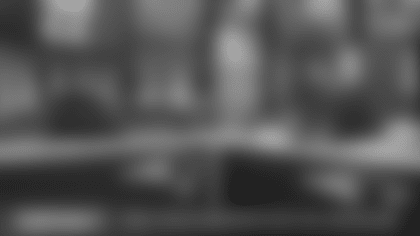BB: We're winding it down. Good to have had some experience against them earlier in the year. Tough team to get ready for; they do a good job in all three phases of the game. I think Coach [John] Fox has done an excellent job with the team on a lot of levels. They certainly have a lot of tough schemes to prepare for, a lot of good players [and] they utilize them well. Hopefully we'll be able to play competitively here Saturday night. I think the players are excited to play. It's been a couple of weeks, but a week off last week, in terms of getting a couple extra days of rest and things like that, was good but I think everybody is excited to play. Hopefully we'll be ready to go.
Q:Have you seen good progress from Logan Mankins easing him back in this week?
BB: Yeah, I think we've seen progress out of everybody. All the guys are out there working. I think each one of them is making progress. We'll see how things go here after stringing these days together. We'll probably have some game-time decisions. There's definitely - a lot of these guys are close. They're getting better.
Q:How important is it to build continuity with your offensive line this week?
BB: It's just important for everybody out there - the offensive line, the tight ends, the quarterback and the running backs to all see the same thing to make sure we all identify whatever it is they're in properly so we can get on the right guy. If one guy sees it one way and another guy sees it another way, then that will lead to trouble. They move Von [Miller] around. They move [Elvis] Dumervil around some, like we caught him on our right side there on the sack that he had. It's not 100 percent; most of the time you have an idea of where they're going to be, but they do change it. Last week, they used a lot more odd look with their dime package against Pittsburgh. I'm sure that they'll have a couple new wrinkles for us as they always do. We'll have to be able to handle those within the game as well as all the other things that they've shown. Again, they're very well coached. They do a good job of utilizing their good personnel and they make it tough on you.
Q:It's supposed to be really cold this Saturday. Are you ready for that?
BB: We're ready for whatever we get, yeah. [We] had over 100 practices this year, they've all been in all different types of conditions, so whatever we get, I hope we'll be ready to play in.
Q:Can you talk about the discipline it takes for your safeties in particular to play against their run-option attack?
BB: Yeah, safeties and the corners. It's a little different game than I think most of the time you play in this league. I think as a defensive back, you're expecting passes on every play and then when you don't get it, you don't get it. But here it's run-force, option responsibilities and then play-action or double moves and things like that. Every time you come out of the huddle, again, The secondary's primary responsibility is always pass, but in addition to that, they have a lot of run-force responsibilities in this game and option and those kind of things. It definitely puts pressure on from that standpoint, that you have a lot more things to think about for a defensive back. Instead of going into the game where you're expecting that every play is going to be a pass. You have to be ready for that on every play, but the reality is that the every play is not a pass. There are a lot of outside runs, there are a lot options plays, there are a lot of plays the secondary force is critical on. It is, it really attacks the entire defense. They do a good job of working sideline-to-sideline and goal line-to-endzone.
Q:Tim Tebow's statistical performances have often been up and down, which often leads people to conclusions on whether he can or cannot play.
BB: I would look at the win-loss record. That's what I would look at.
Q:When you were looking at him coming out of college, is this what you anticipated that he would become?
BB: I think anytime you have a player and you work with him over an extended period of time, you have a greater knowledge and appreciation for his talents and skills and what you can do with them. I mean, that's a tough question. I don't know what the answer to that is. But working with players like Aaron Hernandez or [Rob] Gronkowski or Nate Solder or [Patrick] Chung or [Devin] McCourty or any of those guys, the more you work with them, the you more you learn about them the more you have them in your system and you see how they can be utilized effectively in your system. I think that's true of every player. You can look at his size, his speed and some of his position specific skills. But as far as what he'll really become or exactly what his role and how you'll utilize his skill set, I think a lot of that depends on when you actually get the player and you start putting him in and watch him do those things. Some things will look a little better than you thought they would; some things may not look quite as good. Some things you may not really know and you just have to wait and find out. [Running] backs, for example, in college football that aren't asked to do a lot of blitz pickup assignments, things like that. You can talk to a guy on the board, you can put him in a bag drill, but you don't really know until they get out there and have some experience in it how they're going to handle that. I think how a player, what his role is on your team, really, is something that you have to develop as you get more familiar with a player.
Q:Can you talk about Nate Solder and how he's developed on the offensive line?
BB: Nate's done a good job for us this year. He's come in and he's gotten a lot of reps on both sides, at left and right tackle, but most of his playing has come at right tackle, except for the last game when he replaced [Matt] Light on the left side. But he's versatile; he's also played some tight end for us. He's gotten a lot of playing time. He's handled all the things that we've thrown at him very well: kickoff return responsibilities, field goal, as well as left tackle, right tackle and tight end. He's smart, he's very athletic and he's been very consistent.
Q:I understand you guys have devoted some resources to Bill O'Brien and his Penn State job. What have you done to help him this week?
BB: I think everybody is really focused on this game - him and everybody else. As much effort and energy as we can put into the Broncos, that's what we're all doing. I know Bill has worked as hard as anybody has this week. I think he's very well prepared, I think our team is well prepared and I hope that we will be able to go out there and perform at a good, competitive level as a unit.
Q:Kyle Arrington tied for the NFL lead in interceptions. Is that indicative of the type of season he's had?
BB: I think sometimes interceptions and sacks can be skewed. I'm not saying that positively or negatively. Sometimes they're a result of really good plays; sometimes they're a result of bad plays by the offense and the player can be the beneficiary of that. Sometimes a player makes an outstanding play and it isn't a sack or it isn't an interception, so therefore it doesn't show up on the stat sheet, but it could be a good play. I don't really put too much weight into those. Of course I love to see the quarterback get tackled, I love to see us intercept a pass, but I think those stats can sometimes be a little misleading. But Kyle has had a good year for us. He does everything that we ask him to do - he forces, he tackles, he's got good speed, he's aggressive and he's made a lot of plays on the ball this year. Really, it's a lot about opportunities. Sometimes, some years, players get more opportunities than others. I think the most important thing is being able to take advantage of those opportunities; being able to capitalize on them and make the offense pay the price for a bad throw or a bad read or a tipped ball or something like that. There are some really good plays that result in some interceptions too, but probably at least half the interceptions and fumbles that happen in this league are probably more a result of poor execution rather than great defensive plays on the ball or caused fumbles. A lot of times the ball just is not secured.
Q:What have you learned about Rob Gronkowski in two years, especially after missing his last year in college?
BB: He's a good example of a guy - [Sebastian] Vollmer is another one like that - that had a limited college career for one reason or another. Rob is a guy that has really improved every day over the last two years. Things that he did last year as a rookie, he improved on during the course of the year and this year he started at a much higher level than he did last year. He's improved on a lot of things this year and we've asked him to do some more things. We've asked him to do things this year that he wasn't asked to do last year. He's worked at those and become somewhat proficient at them and that's helped him and his production and it's helped the overall balance on the offense. He's a guy that works hard, that really cares about football, that gets things right. Sometimes he needs to see it on the field, needs to get a good look at it. Again, his experience level is growing, but it's still not maybe as high as some players. But once he sees it, once he understands it, you usually don't have to worry about it really ever again. That's really the mark of a good player, is to be able to take an experience, learn from it and then be able to apply it the next time it comes up. That might be a month later, it might be a year later, but when it happens again, if he can do it right the next time, then that's a player who is really growing and developing. I think that's what great players do, they're able to do that.
Q:When you were doing your prep work on him, did his personality ever concern you?
BB: I think Rob likes football. He always has a smile on his face and he always is working hard. Whatever you ask him to do, he does it. Whether it's running, blocking, after practice, hustling back into the play - he always jumps in there and competes well and does it with a smile on his face, even sometimes when you're yelling at him. I think he's got a good attitude and a good approach to the game and he cares. It bothers him when something doesn't go right, like it should, really, like it bothers any good competitor.
Q:Based on the game film, what area has Denver improved on the most since you last saw them?
BB: I think they're getting better every week. They do a good job, do a good job in every area really.
Q:There's no one specific area?
BB: I think their whole team. They've added some things to their sub defense, like their nickel and dime packages last week. [Von] Miller looks like he's playing - he's still got that thing on his hand, but I think it's less restrictive. Offensively, they continue to use multiple players. They get production out of all their backs. [Willis] McGahee missed some time against us, but other guys stepped in and were productive. You see them adding plays, adding formations; it's hard to tell how much they're checking, but clearly there's some communication going on at the line of scrimmage relative to defensive looks. I think you see a lot more of that, that Tim [Tebow] has with the offense and the communication that they have on the line of scrimmage. Special teams, they've added a couple wrinkles to their rushes and their returns. Obviously, very good specialists, they're very dangerous in that part of the game, too. Look, I'd like to think that any team that continues to practice and work hard over a period of three, four weeks is going to improve. If you don't, then what are you doing? I think we've gotten better. I think they've gotten better. I think probably every team you look at, that can do that, if they can work and continue to go out there and perform then they should improve. It's just how you improve relative to how the other teams improve.
Q:How concerned are you that they can beat you with the deep ball like they did against Pittsburgh?
BB: I think you have to worry about everything with Denver's offense. You have to worry about the running game, the passing game, the backs, the receivers, the quarterback, the offensive line. They're a well balanced unit. They get production from everybody. Everybody has to take care of their job. If you just load up on one thing, then you pay the price somewhere else. You have to be able to handle all the elements of the offense. They're going to test you on all of them, you know that. They're going to test you with their receivers down the field on catch-and-run plays, they're going to test you inside, outside in the running game, with the quarterback, the running backs, some type of reverse or gadget play. They run those things every week and you're going to have to be ready for them. You don't know when or which one it's going to be, but they're going to test you out on that. I'm concerned about all of it, of course.
Q:Some of the players have mentioned they're treating this like any other game because they don't want to get overwhelmed. Do you want the players to treat this like any other game?
BB: I want us to go out there and perform to the best that we can on Saturday night - that's our goal. Play our best game of the year Saturday night, 8:15 - that's our goal.
Q:Did you learn anything about Mark Anderson when he came in for Andre Carter in the last Broncos game?
BB: Mark has been a consistent player for us all year and so has Andre. Andre's done a great job for us. They're different players, but they both have good skill sets and they both are productive. I don't think they play exactly the same way, but they've both been productive and they've certainly been good additions to our teams this year, both of them.
Q:Is their running game still as unique as anyone in the NFL with the zone blocking and Tim Tebow?
BB: I think what separates them from everybody else is the amount of option that they run, whether it's the triple option where there's actually three players involved or whether it's the quarterback handing the ball off but potentially keeping it away from the direction of the play. You don't see a lot of teams do that, I think that's what's - when they just hand the ball off, then their plays are similar to everybody else's. They obviously have their own unique players doing them and that makes them unique, but the amount of the quarterback keeping the ball with the different combinations of blocking schemes that they have and the true option plays, either speed option or triple option where it's dive, quarterback, pitch, you don't see that very often in this league. We're going to see that a lot Saturday night and so is every other team. Those are the things you really have to, they're different. We just don't see that.
Q:Could you see almost immediately that Tom Brady and Deion Branch had a connection on the field?
BB: Deion is a very instinctive receiver. He was in college at Louisville and then from day one when he got here. He's smart, he learns very quickly and he just understands the receiver concepts and techniques. If you tell him what to do, but you don't really tell him what to do, just say, 'Okay, do this, just run this route.' Okay, but then a lot of things can happen on the other side of the ball. He almost always does what the quarterback would expect him to do. He just has a good instinct and a good feel for what the right decision to make is based on what he's seeing and then so that he can help the quarterback, where he can be in the spot where the quarterback wants him to be, when he wants him to be there. Timing is such a big part of the passing game. The quarterback, he wants to throw the ball when he's ready to throw the ball when the receiver is open. It doesn't do any good for him for the receiver to be open before he's set up. A lot of times, it doesn't do any good for the receiver to be coming open late after he's already ready to throw and now he's got to hold it and you run into protection problems. What you really want is for the receiver to come open as the quarterback is ready to deliver the ball. Deion has a great sense for that timing. Some plays are different. You tell a guy to run a route at 15 yards on air, great. But now there's a corner up there and he gets pushed or the next time he gets jammed a little bit harder or the next he comes and he beats him off the line and he's clean. For the timing to be the same on those routes, they can't all be at 15 [yards]. They're just not going to happen at the same time because the transition is different. But the quarterback is dropping back and he's ready to throw. Those are the kind of things that Deion does that I don't want to say you can't coach, but it's hard to coach those things because every one is a little bit different. If somebody flashes in front of the receiver - if he's running a route and they play zone and somebody flashes in front of him, then what do you do? Do you stop? Do you go past him? Do you go in front of him? Do you go behind him? And those guys are moving too; they're not just standing there. They're running at you, you're running at them. What decision do you make? Again, he almost always does the right thing. Just like Troy Brown, just like Kevin Faulk. You can run a play, you can practice it all year, and then something can come up in the season that it's just not the way you talked about it, it's not the way you practiced it. Then what the player does, you look at it and say, 'That was the right thing to do,' and the quarterback saw it that way and the receiver did it that way and you have it. That's a long answer to a short question, but Branch is great at that, he's great at that. As was Troy, as was Kevin, those guys were, and Randy [Moss]. Those guys just knew where they could go, how long they had to get there, how to do it and it was, 99 percent of the time, as the coach if you said, 'Okay, this situation, this is what we want you to do,' that's what they would do.
Q:When he came back last year, was it really as seamless as it looked after four years being away?
BB: Again, Deion had a lot of that coming out of Louisville, he really did. He had a lot of that coming out of Louisville. Coming back here, of course he knew our system. There was regaining the timing with Tom [Brady] and all that. But again, that's who Deion is. I think you could put him in any offense and make a decision relative to timing and route adjustments and releases and those kind of things. If you just tell him kind of where you want him to go, I think he'll find the best way to get there and be there at the right time once he understands what the concept of the play is. I don't want to say - I know he's gotten better at it and he's progressed as a player through the course of his career but he started at a high level and he's done that throughout his career. He's really good at those things. Even back when Troy [Brown] was here, there were times when we had him in the slot and you put him in the slot for a play - those are the kind of things, you go into a game and you know, the Carolina game, 'Okay Deion, you get over in the slot, we're going to run this route.' You practiced it against one coverage or you practiced it against two coverages, but then you get in a game, who knows what they're going to run. You just can't practice it against 30 different things, like Troy had run it because he played there, like Wes [Welker]. Wes has seen everything you could see at that position, Deion hadn't. He goes in there and has to make an adjustment and you just are confident that he'll make the right one.
Q:Do Aaron Hernandez and Rob Gronkowski have some of those same skills, not that they're in the same class as Deion Branch, but do they have some of it?
BB: I would say that they're both definitely learning and learning fast. Do they have some if it? Yes. Deion and Kevin [Faulk] and Troy [Brown] and Randy [Moss], in a lot of ways, I would put those guys at an exceptional level, I mean rare. I would say that Rob and Aaron are young. They're not at the same point in the career as we're talking about those other guys. Could they get there? Possibly, possibly. They've really, compared to last year, both of them are so far ahead of where they were last year doing those kind of things. You just don't know where it's going to stop. Is it just going to keep going or at some point is it going to level off? When does it become kind of too much? But I would say, from what I've seen, there are still a lot of things they can do better and they're doing a lot of things well.
Q:Nationally, Rob Gronkowski gets most of the attention. Could you talk about Aaron Hernandez if he was the tight end?
BB: He is a tight end.
Q:If he was the tight end on your team, the way Jimmy Graham is in New Orleans.
BB: I mean, I don't know.





































